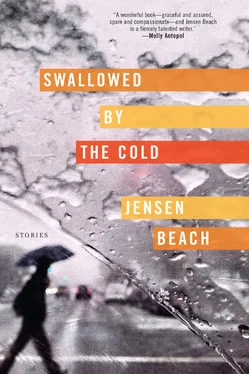Now he couldn’t recall the pleasure of the evening. He couldn’t enjoy how satisfied and enjoyably tired he felt. Instead, all he thought of was the look of pain on her face. He turned toward her and lifted himself up on his elbow. “I hope I didn’t hurt you,” he said.
He heard her shift to her side. She reached out to him and put her hand on his chest. “Not at all,” she said. “I didn’t feel anything at all.” He knew she was talking about his elbow, but the idea that she might be talking about their lovemaking formed a tickle of panic in his throat and he coughed. He lay back down and didn’t resist when she rested her cheek on his chest and kissed him just below his collarbone.
He slept fitfully. At 6:45 the next morning, the radio turned on to a morning political talk show. The topic of the program was the anniversary of Anna Lindh’s assassination. The panelists shared Helle’s opinion from the night before that something unidentifiable but important had changed in the past five years. Every terrible accident meant something now. Every tragedy was a sign of another to come. It was a new country. And in it, no one was safe. The panelists discussed party leadership in the Social Democrats. In Anna Lindh’s absence, a clear leader had still not emerged. One of the panelists attributed the conservative victory in the last election to this fact. He felt Helle begin to stir beside him. Maybe she had it right. There was something waiting for him. He didn’t know what it was or when it would happen, but it was there. His thigh itched and he reached his hand beneath the duvet to scratch it. He ran his fingernail over a rough patch of skin where a drop of semen had dried to a flaky tear.
She stretched her arm out toward him and touched his shoulder. “Good morning,” she said. He imagined himself getting out of bed and dressing, leaving the house with a simple apology. As he thought this, it was as though he’d already done it, and he was pleased with himself for making such a decision.
She knew without touching the man that he was dead. And she knew without looking too closely at the bloodied hair all washed to one side that it was her neighbor Rolf Strand. He was lying in the center of the canal path near where it bent straight north and skirted the coast. Not far from Rolf’s body, a bicycle was propped up at a funny angle in the dirt. From this arrangement, it was easy to see what had happened. She threw up twice onto the spongy moss beside the path.
In the days after her discovery, Ingrid had met with the police, been asked questions she didn’t know how to answer. Her mother had been dead since January. A social worker came to the house. The social worker touched Ingrid’s arm, said she understood, said her name was Jenny. Jenny listed words— ice, water, bicycle —and asked Ingrid to name the first association that came to mind. Ingrid’s father watched, leaning on the peeling green wallpaper in the dim kitchen. Jenny said, “Tree.” Ingrid said, “Tree.” When it was over, Jenny smiled and left the room with Ingrid’s father. She heard them whispering at the front door. “Not for now,” she heard. “Time heals all wounds,” she heard. Everyone in the village, her father, the police, her brothers, they all spoke to her slowly, stepped too far away, as if she were an object they were afraid to break.
She hardly spoke that summer. Her father gave her tasks. She learned to cook simple meals. She cleaned the house every week. She sailed with her brothers in the sun-cracked dinghy. When they tried to go out far, she gripped the boat’s rail until they turned back.
The first storms of fall helped. She began to hope for them.
On All Saints’ Day, she stood at the tall window in the front room and watched a storm tumble in from the east. The twins, Eskil and Einar, were chopping wood for the furnace. She heard their laughter and the ax splitting the wood. The dark line of the storm’s approaching shadow stretched across the water. Ingrid had planned to make her mother’s favorite meal — baked whitefish fresh from the fisherman — to celebrate her mother. They’d never observed All Saints’ Day before, because they had never had anyone to remember. The rain would make the walk to the fisherman cold and wet. Through the window, she watched the clouds swell.
The ax fell again, and again a log split. Her brothers were making good progress. She looked at the clock. It was a quarter to four in the afternoon. Her father had promised to be home by five. He’d gone to the village for wine and groceries. Nearly every night she heard her father drunkenly whisper prayers.
Ingrid’s mother was buried in the tree-filled cemetery of the small church out on the stubby peninsula on the island’s southeast corner. Ingrid and her father planned to drive to the cemetery and place a grave candle at the headstone.
She pulled a sweater on over her head. It was one of her mother’s old sweaters but no longer smelled like her mother. Ingrid’s mother had drowned in the icy water of the Baltic while out skating on the thin sea ice. There’d been a warm stretch of days, each starting with a warning from the municipal authorities about the thinning ice. But her mother insisted on going out. She was training for a trip she took every February with her skating club to the frozen rivers of Norrland. That day they’d planned to cover ten kilometers, out and back. They’d kept close to the shore, and had seen no reason to use the safety lines. Ingrid imagined the accident so often it had become a memory. The water seeping up through the ice, the long strokes of her mother’s legs closing the distance at great speed. The ice cracked, moaned, cracked again. The splashed water from her mother’s flailing arms, the shouting, the panicked call on the cell phone for help. It took a team of divers three hours to recover the body.
By spring, her mother had disappeared from the house. First it was her clothes, then her books, and her jewelry, the serving dishes Ingrid knew her parents had been given as a wedding present. Her father had put all of her mother’s belongings in boxes and stacked them in neat rows in the small building up on the rocky hill behind the house. The building had once been a guest cottage. When she was very young, Ingrid used to play there. Sometimes at night, she watched the windows of the cottage lit dimly around her father’s grieving silhouette.
She left through the back door so her brothers wouldn’t see her. She planned to walk to the fisherman and buy two whitefish. The clouds were dark and heavy over the water. She knew she would not beat the rain. She moved quickly around the house and down the front path. The sea was whitecapped, the road ahead of her dark. Behind her she heard her brothers laughing and the ax dropping into the chopping block and the hollow sound of split logs being thrown atop already-split logs.
His arm weighed three kilograms. To figure this out, Fredrik Holm weighed himself twice, once with the arm on and once with it off. When he was finished he replaced the scale in its spot beside the toilet. He left the arm resting on the sink. Without the arm, he felt out of balance. The orthopedic specialist assured him this displaced equilibrium would pass, but it had been nearly a year since he lost his arm and the sensation had yet to decrease. He looked at his reflection in the bathroom mirror, turning to block his incomplete half. In spite of his best efforts to conceal his disability, it was impossible to mask the sharp dip of his left shoulder and the effect this had on his posture.
Outside, the rainwater poured steadily from the broken gutter above the bedroom window. Tomas, the Polish man who lived in the village, would repair it if only Fredrik called. Fredrik disliked asking for help. He heard the water slapping into a muddy puddle.
Читать дальше











